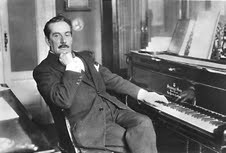This week we saw La Rondine at the Met. We got last minute discounted tickets from a Met Opera email offering 25% off selected performances 26 hours before La Rondine’s curtain. A FULL 25% off, mind you. Not the “buy one get one 25% off” that we had received before. And thank god really as we have not won the wonderful Met weekend $25 ticket lottery in over 6 months. (I’m starting to think there’s a conspiracy.) But it got me wondering about how such deals work. There are discounts for several performances in the coming month. If Rondine isn’t selling well with only 24 1/2 hours before the performance, I understand pushing the tickets, but how do they know about the performances weeks later? Some discounted evenings were Fridays and Saturdays. There was no pattern that I could discern. I would very much like to know the criteria for choosing which performances will be discounted as we never seem to win the GREAT Met lottery anymore so discounts where we can get them are much appreciated. Going to every opera at the Met is getting pricey!
 I have never seen La Rondine, but had high hopes as I love Puccini operas. I’m not quite sure why I adore everything Puccini, but I do. I love the playful yet romantic music, and the characters in his operas are always relatable average people, for the most part. As in La Bohème, there are no kings going off to battle or giant mythical beings. The scenes always connect with me and are warm and inviting, places I want to go. Plus the characters sing about things that everyone can relate to—aside from the obvious, love, there is discussion on whether the maid is wearing too much lipstick, eye shadow. Which hat, which coat to wear when going out with her lover.
I have never seen La Rondine, but had high hopes as I love Puccini operas. I’m not quite sure why I adore everything Puccini, but I do. I love the playful yet romantic music, and the characters in his operas are always relatable average people, for the most part. As in La Bohème, there are no kings going off to battle or giant mythical beings. The scenes always connect with me and are warm and inviting, places I want to go. Plus the characters sing about things that everyone can relate to—aside from the obvious, love, there is discussion on whether the maid is wearing too much lipstick, eye shadow. Which hat, which coat to wear when going out with her lover.
 But there were so many other great aspects to this production. Nicolas Joël’s scenery was a nice break from the single wall moving around dividing the stage I have seen in my last few Met productions. The flapper costumes, art deco touches and tiffany inspired glass windows were fun and very Great Gatsby-ish. I loved Ruggero sporting the white sweater vest over white pants. This opera also seemed unusual to me as it was set very close to the period in which it was written by Puccini. He originally set in the mid 18thcentury, but presenting it in Puccini’s era helped me to think about what historically was happening when he wrote La Rondine. It was also fun to think about Puccini as a character in this opera and I wondered who he most identified with. All things the time period brought to mind for me.
But there were so many other great aspects to this production. Nicolas Joël’s scenery was a nice break from the single wall moving around dividing the stage I have seen in my last few Met productions. The flapper costumes, art deco touches and tiffany inspired glass windows were fun and very Great Gatsby-ish. I loved Ruggero sporting the white sweater vest over white pants. This opera also seemed unusual to me as it was set very close to the period in which it was written by Puccini. He originally set in the mid 18thcentury, but presenting it in Puccini’s era helped me to think about what historically was happening when he wrote La Rondine. It was also fun to think about Puccini as a character in this opera and I wondered who he most identified with. All things the time period brought to mind for me.
 Musically, the orchestra was very good under Ion Marin. The pace felt lively and the production moved along. And the cast overall was very good. Kristine Opolais was making her debut and she was wonderful as Magda. She was confident and I loved her voice. Unfortunately Giuseppe Filianoti, the tenor playing Ruggero, at times appeared to have trouble with his throat being closed—or perhaps just I felt like he was having trouble with his high notes. Some of the other singers, like Anna Christy and Marius Brenciu, sometimes were hard to hear. Perhaps the orchestra was drowning them out. This left me focusing a great deal more on the music. I noticed that several of the themes sounded a great deal like Turandot, which I also love.
Musically, the orchestra was very good under Ion Marin. The pace felt lively and the production moved along. And the cast overall was very good. Kristine Opolais was making her debut and she was wonderful as Magda. She was confident and I loved her voice. Unfortunately Giuseppe Filianoti, the tenor playing Ruggero, at times appeared to have trouble with his throat being closed—or perhaps just I felt like he was having trouble with his high notes. Some of the other singers, like Anna Christy and Marius Brenciu, sometimes were hard to hear. Perhaps the orchestra was drowning them out. This left me focusing a great deal more on the music. I noticed that several of the themes sounded a great deal like Turandot, which I also love.
 –Elizabeth Frayer and Shawn E Milnes
–Elizabeth Frayer and Shawn E Milnes
Related Articles:
You, In This Tomb?: Aida at the Metropolitan Opera
Blinded By Love: Elisir at the Metropolitan Opera
Carl Jung, BDSM and The Flavored Popcorn Dilemma
Anvils and Infant Incinerations: Il Trovatore at the Metropolitan Opera



Ruggero reads this letter from his mother saying, "I think it's great you met this very young virgin who would never, never lie to you, and so I look forward to meeting her too," and Magda is suddenly hit with how much she has lied to Ruggero. We don't even know that she has told him her real name even. So she suddenly sees herself as a cheat and something of a user, and because she genuinely does care for Ruggero, she wants him to be free to have an honest relationship, something he can never have with her.
In performance this can feel like Magda is ashamed of being sexually experienced, but her shame in fact is that she has been so selfish. And so the only solution is for her to take on the responsibility of being unselfish, that is, releasing Ruggero from a relationship with a woman he doesn't even know.